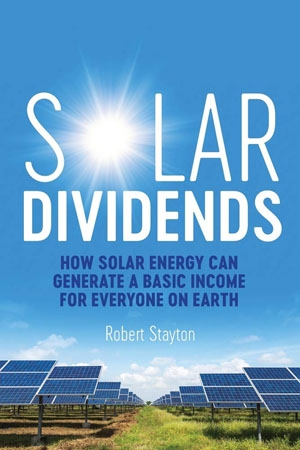Solar Dividends
How Solar Energy Can Generate a Basic Income For Everyone on Earth
Built upon research and nuance, Solar Dividends is a powerful, valuable proposal for tackling energy and resource scarcity.
Robert Stayton’s Solar Dividends is a blueprint for tackling multiple pressing social and environmental problems.
Bold in envisioning a phased solar panel build-out this century, the book proposes that dividends be paid to each person who builds them, guaranteeing a universal basic income. Such a plan would confront global poverty, income inequality, and global warming while also providing sustainable clean energy.
The text first outlines how solar dividends might work, using the illustration of a hypothetical individual living in the year 2099, whose world had addressed an energy crisis in 2025. This imaginative exercise is an effective device that makes the book’s ideas more concrete and personal.
After the central characters expectant parents registered him with the local solar co-op, the example goes, the co-op would install dedicated solar panels to generate electricity for the utility grid. By the time such a person were four years old, their personal Solar Fund would be earning projected modest dividends, to be paid out on their eighteenth birthday, with further dividends generated after.
Such a modest base income, the book suggests, would allow for college tuition, family care, and supplementary income. This is visionary work that extends its imagination to suggestions for growing food, alternative jobs, and rural and urban replication across the globe.
This unique and fascinating proposal is explained in clear terms. However, it hinges on wide social acceptance of its central notions, including that energy is an essential commodity and that clean, renewable energy is worth paying more for. Even if such a plan were gradually phased in, it is hard to envision politicians, fossil fuel interests, utility companies, and energy consumers abandoning cheap energy without resistance.
The book’s logic and numerical support, which are fleshed out in fine detail in the book’s second half and its appendices, are compelling. Its model is supported by direct language and extensive documentation. The outlined suggestions are appealing in their promise of fair incomes and equitable distribution of resources, and the book leaves little doubt as to the inevitability of needing more sustainable sources of energy. It only falters in glossing over the fact that human beings tend to be illogical when making long-term decisions. Discussions of how policymakers and activists might avoid the tragedy of the commons are absent.
Built upon research and nuance, Solar Dividends is a powerful, valuable proposal for tackling energy and resource scarcity, pollution, income inequality, and environmental stresses.
Reviewed by
Rachel Jagareski
Disclosure: This article is not an endorsement, but a review. The publisher of this book provided free copies of the book and paid a small fee to have their book reviewed by a professional reviewer. Foreword Reviews and Clarion Reviews make no guarantee that the publisher will receive a positive review. Foreword Magazine, Inc. is disclosing this in accordance with the Federal Trade Commission’s 16 CFR, Part 255.

